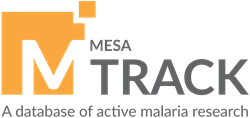Established in 2018 by the ASTMH Board of Directors, the Trainee Members Committee presents "Spotlights" to highlight resources, trainee member research and experiences in the field, as well as current issues relevant to our future leaders in tropical medicine and global health. We hope to share the extraordinary contributions to science that our student, trainee and early-career members are making and provide insight on shared concerns and useful resources that can enable successful career progression. – Koya C. Allen, PhD, Trainee Members Committee co-chair
Resource Spotlight

A discussion with ASTMH members Maria Tusell, Elisabet Marti, PhD, and Kate Whitfield from the Malaria Eradication Scientific Alliance (MESA Alliance) team about the MESA Track knowledge management tool.
What is MESA Track?
MESA Track is an open and living database that captures research projects and institutions’ research portfolios in malaria. The platform informs the malaria community about which questions are being addressed and which innovative strategies are being tested, and aids collaboration and knowledge sharing. The database provides comprehensive views of research areas for partners to use and analyze, including research landscapes also known as “Deep Dives.” These landscape exercises have assisted stakeholders such as the WHO Global Malaria Programme in policy development processes and supported funders in strategic planning. MESA Track reveals who is funding what, and can be used to identify which researchers, institutions and funders are working in different fields of malaria research. MESA Track is a knowledge management tool developed by the MESA Alliance, which is hosted at ISGlobal and supported by a grant from the Bill & Melinda Gates Foundation. To learn more about MESA Track view this introductory video:
What is MESA Track?
Contact information:
[email protected]
Website:
http://www.mesamalaria.org/
1. What makes MESA Track a unique tool that is beneficial for malaria researchers globally?
MESA Track aims to be a "one-stop-shop" for anyone who wants to know more about the current research in malaria. By mapping who is doing what research and where, who is funding it, and when new results are expected, it provides an overview of the work being done all over the world. It captures the whole life of a project, from the planning phase to the publication of results, capturing presentations of preliminary results at conferences and updates, so it can also help to know what is being done that has not been published yet, by providing more information about the current research in the field.
2. How can MESA Track be used at different stages in your career, from a student or early-career professional to an expert in the field?
MESA Track is useful for anyone needing to scope out who the lead researchers are in a given field. MESA Track can help find experts in your area of interest, find mentors in specific fields, collaborators in specific countries, or know who is working on the same issues as you are, enabling collaboration and knowledge sharing.
3. What have you learned from working with and using MESA Track in your daily work?
There have been some surprises! One of the first partners we worked with was so surprised to see their malaria research organized as a portfolio they said, “Wow! Can I have a copy!?” Another surprise was how many funders were investing in different areas of research in malaria. Sometimes the “big-dollar funders” get all the attention, but there are many funders committed to malaria research. For example, whilst many in the malaria community were debating the concept of Ivermectin for malaria, the NIH/NIAID had been funding some of the key studies for years.
Collaboration is key. Learning from the experiences and lessons learnt from others is vital to advance our knowledge and evidence. With MESA Track, you can create a network of researchers that have the same questions as you, and this can facilitate conversations and the exchange of information that can be very useful to disentangle questions, issues and move the science forward. MESA Track also shows the importance of basing our policies and recommendations on the evidence emerging from the field, which we accomplish by collaborating with the WHO Global Malaria Programme through the
MESA Deep Dives.
4. What advice do you offer to early-career ASTMH members in malaria research and global health who want to get involved with using the tool?
I think a great way to use MESA Track is to find collaborators all over the world. You can see who is doing research in genetic epidemiology in Senegal, which labs are developing monoclonal antibody technologies for malaria, who the experts are in
P. vivax biology, and much more! For new graduates looking to get into malaria research, MESA Track would be a great tool to find research groups you want to work with.
The best way to get familiar with MESA Track is just browsing the tool! Also, we welcome everyone's input! At the end of the day, this is a tool from the community for the community, so everyone is welcome to add their research and share feedback and comments.